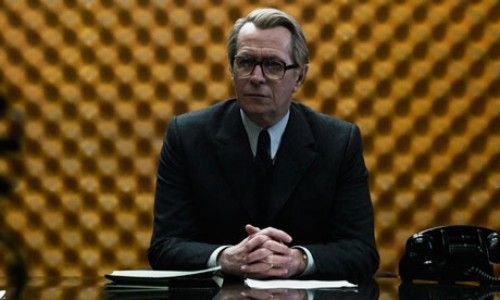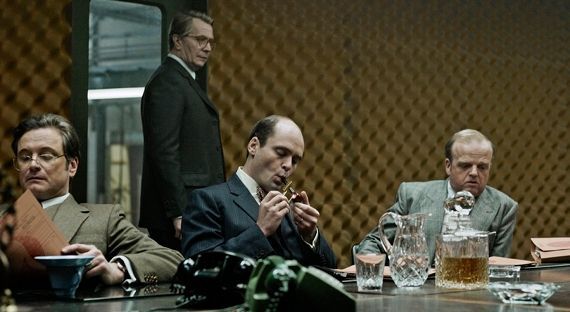Tinker Tailor Soldier Spy, which has just been released in the US on DVD and Blu-ray, was a critical and commercial success during its recent cinematic release, receiving great reviews and an impressive box office ($80 million worldwide).
The Tomas Alfredson (Let the Right One In)-directed adaptation of author John le Carré's novel features an impressive cast, including the likes of Gary Oldman, Colin Firth, Tom Hardy, John Hurt and Mark Strong - as well as TV’s Sherlock, Benedict Cumberbatch. Released last year, the film had a solid run with awards nominations (including an Oscar nomination for Oldman) and it showed that thought-provoking films can still do well with audiences as well as critics.
Screen Rant spoke with the Tinker Tailor Soldier Spy’s BAFTA-winning and Oscar-nominated screenwriter, Peter Straughan, who discusses the film’s success, the difficulties of adapting a beloved novel, and its chances of having a sequel.
What’s the process of adapting a novel for the screen?
You read it a couple of times, you mark the text and highlight sections. I kind of run a version of the film through my head and I can tell which bits of the book are turning up in that film. 'Tinker Tailor' was more complicated because it’s very, very dense.
Are you ever worried about leaving bits out – plot points or little things that fans of the novel would be interested in?
A little bit. More so, again, than usual with this. Le Carré fans, especially in the UK, are intensely loyal and protective. They were probably worried about a film full stop. It had been a five-hour TV adaptation, or whatever, and I think they probably (understandably) thought that you can’t do it in two hours. They thought we were going to screw it up in some terrible way.
Do you ever get halfway through a draft and realise that maybe you’ve forgotten something important?
It wasn’t that unusual on this one to be re-reading a section and suddenly you realise the significance of something that you hadn’t seen before.
Do you ever change things once actors get involved or are you finished with the process at that stage?
It can change from film to film, but on this it didn’t really happen. There were a few lines, there was one, the boardroom scene, where they were all sitting at the table. In the original draft, Colin’s character didn’t say anything at all, but when they were rehearsing they realised that it was drawing too much attention to the character. I wasn’t there (as my wife had died) so they went to Le Carré who came up with the line.
There were a few lines with Gary, where we just simplified the language from the book.
You seem to be the go-to man for adaptations: You’ve done The Men Who Stare At Goats, How to Lose Friends and Alienate people and The Debt, which is an adaptation of another film. Do you find this challenging, or is it something that you are now comfortable with?
It depends on the material. If you get a really great book then it’s just a joy.
The adaptations that you’ve done are all quite political - is there something about that which draws you to the material?
I’m surprised, I wouldn’t have thought they were all political, except in the broadest sense. I suppose I’m increasingly able to pick the work that I want to do.
Something like The Men Who Stare at Goats is so bizarre tonally, and you added an aspect that made the material engaging.
Thanks very much, and again, with the book, I read the first chapter and thought “I want to do this.” I’ve become friends with the author, Jon Ronson. It was a real pleasure to work on.
You’re a playwright as well, do you find that more relaxing than the film work, because there’s more of you in it?
They’re very different. With a stage play, all you’re working with is language and dialogue, and not much else in the tool box, and that becomes very disciplined. That can be challenging and also very liberating.
Do you feel that the writer’s words carry more weight in theatre because cinema is more of a director’s medium?
There’s no doubt that the writer is considerably higher up [in] the pecking order in theatre. Your experience on a film very much depends on the director you’re working with. Tomas [Alfredson] I got on really well with from the beginning and that was a joy. I’ve never really had a bad experience with a director - I’ve been lucky. There’s no doubt about it, the writer is considered the last word in theatre in a way they just aren’t in cinema.
Having said that - you’ve received a lot of credit for Tinker Tailor. It’s a Le Carré novel, with a great cast, but you haven’t been left out. It must be very rewarding for you, yes?
It was to be honest. I wasn’t really expecting it because you work on it. It was a difficult adaptation, but also very rewarding. You don’t expect people to know that, but for some reason people did get that - and the Academy Award was a real surprise. I wasn’t expecting that at all.
The film has been incredibly successful – over $80 million worldwide. However, even with the cast of stars it must have been a risky commercial prospect on paper. Did you think that it would even have a fraction of its success?
No. Best case scenario was that it would be loved by a small audience and it would do well in Britain. I didn’t think that it would do box office anywhere. I was pleased when it had good box office and amazed when it did pretty well in the US as well. We didn’t set out to be populist, but people liked it anyway.
So many films are aimed at teenagers and people in their twenties, but this is a film about a lot of middle-aged men sitting around talking - it makes you realize that cinema isn’t dead.
I completely agree...I completely agree! It was very much down to Tomas Alfredson, who was in charge of every aspect from the performances, art direction, to the music and the script.
There are a few Smiley novels – are there plans for any sequels. And are you interested?
Yeah we are. I said I would do it if Tomas is doing it, and Tomas said he’d do it if I was doing it. I think that we both want to go off and do something different next. Tomas wants to make a film in Sweden, so that he can be home for a while. The idea is, and we’ve talked to Le Carré about this, to come back and do a version of Smiley’s People, which is the final book in the Karla Trilogy. So, we’ve talked to Le Carré about opening that up.
So, it’s a world that you enjoy and want to stay in?
Yeah, it is.
-
You can order Tinker Tailor Soldier Spy on DVD/Blu-ray, HERE.


